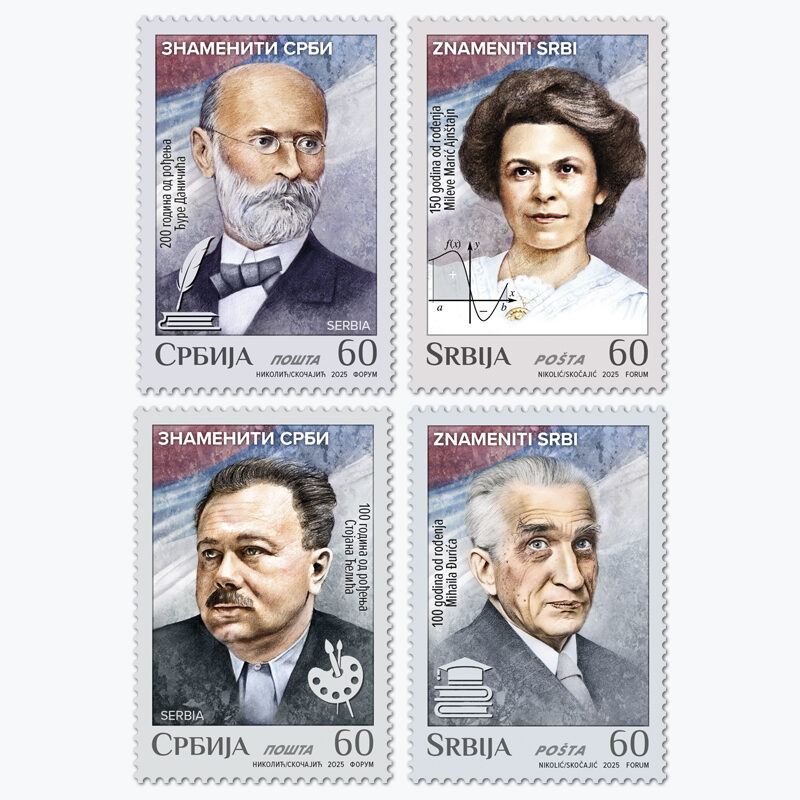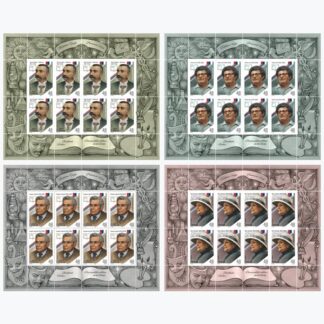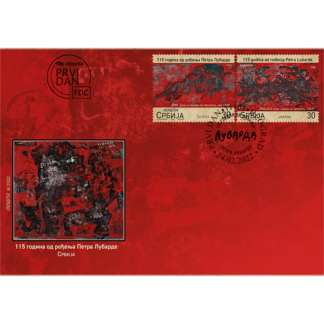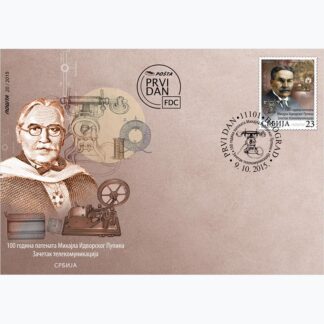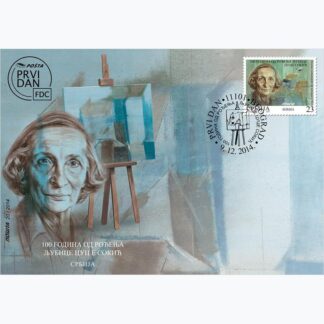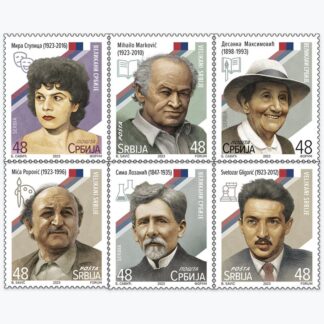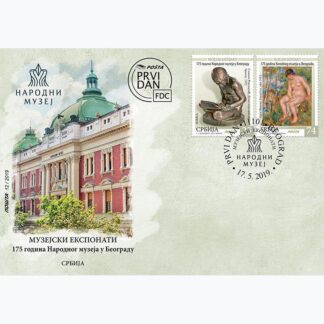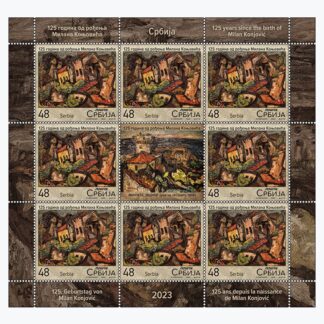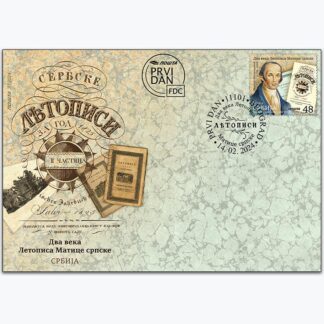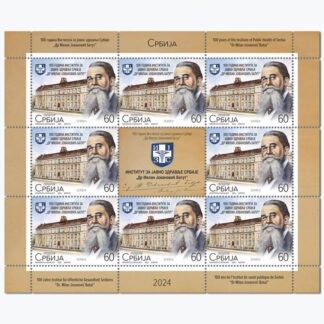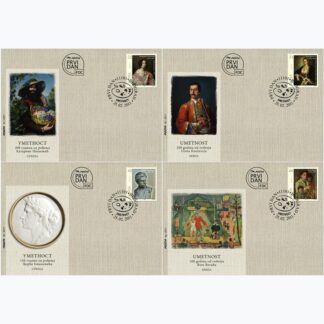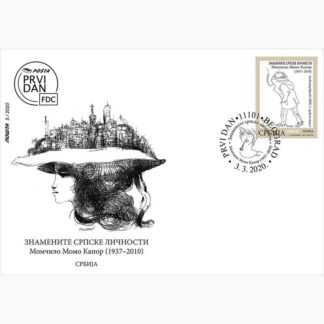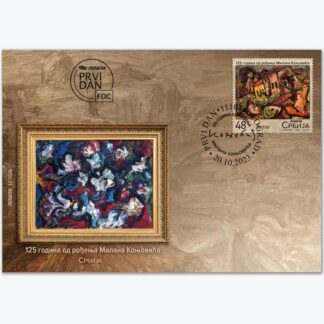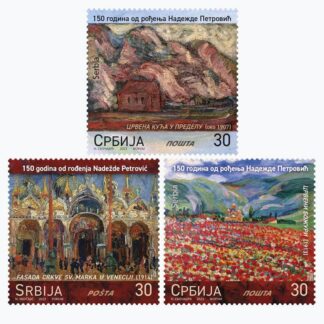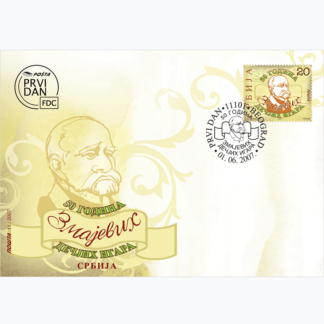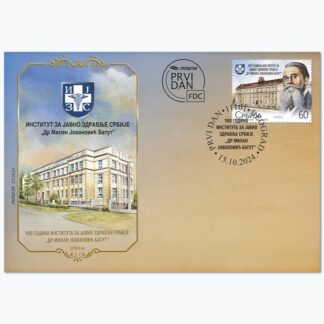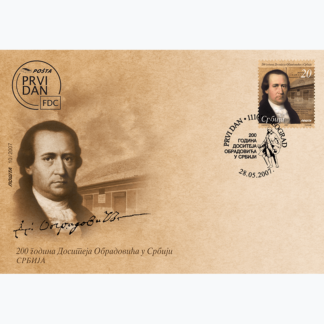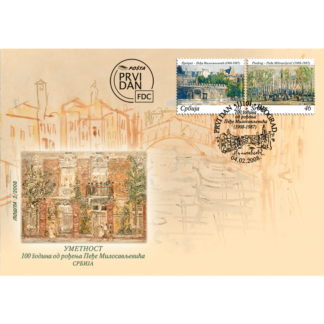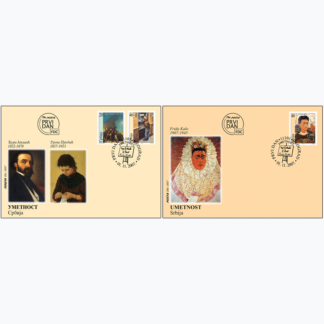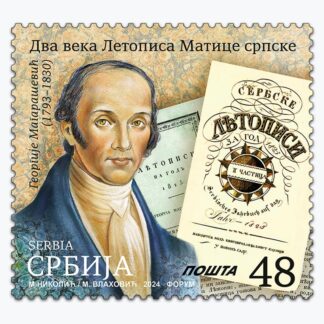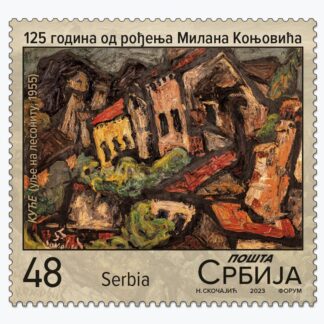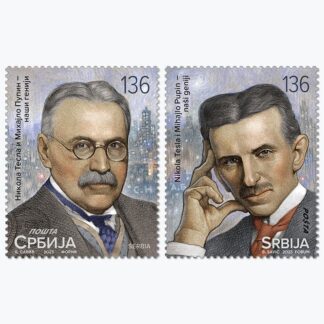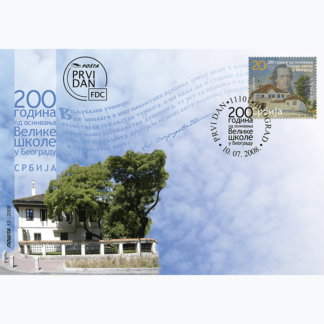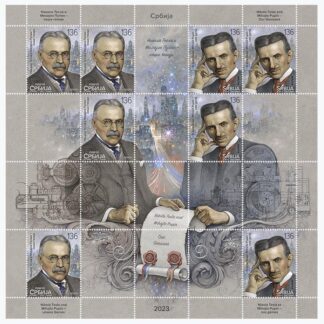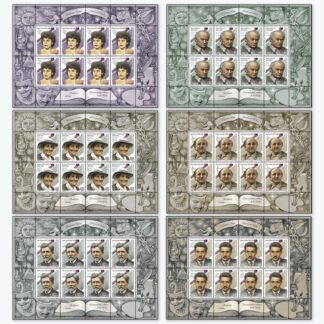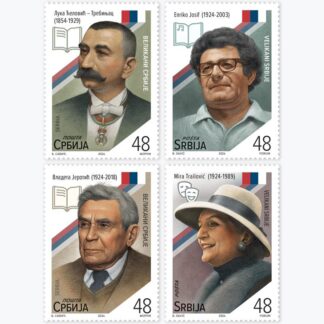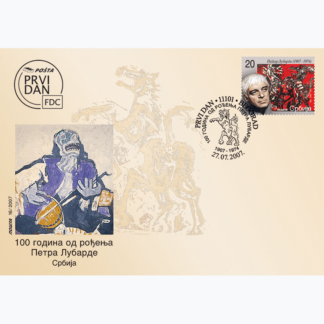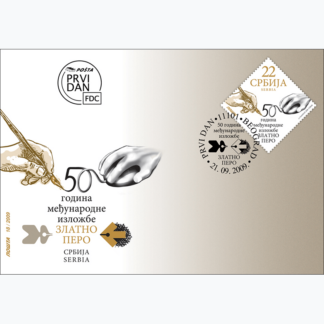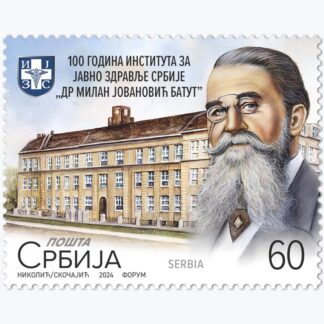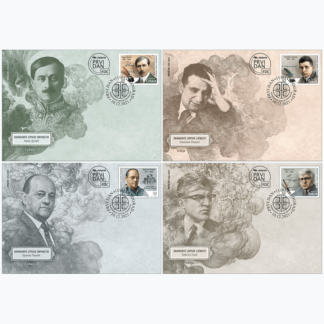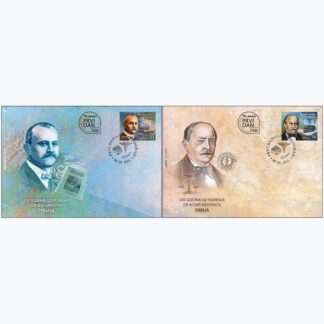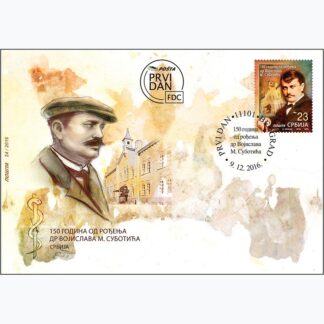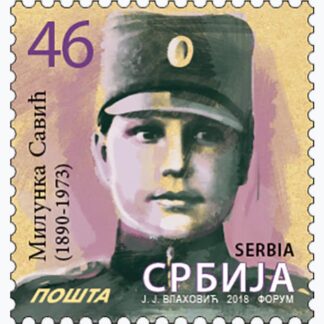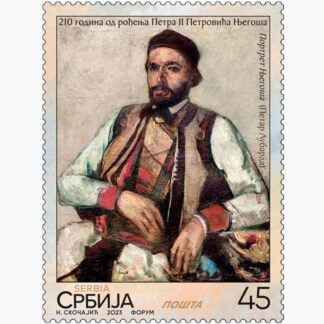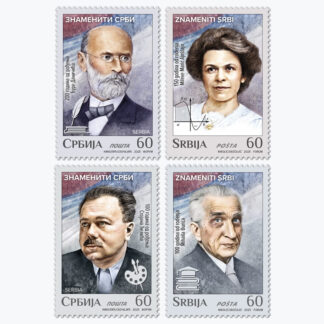Description
200th anniversary of the birth of Đura Daničić
Đura Daničić (April 6, 1825 – November 17, 1882), a Serbian philologist, member of the Society of Serbian Letters and the Serbian Learned Society, marked Serbian linguistics in the second half of the 19th century. An agile supporter of Vuk Karadžić›s reform, with his commitment and work he made an immeasurable contribution to the constitution of the Serbian literary language, describing and prescribing its morphological, syntactic and accentual system. He published the Little Serbian Grammar and Forms of the Serbian Language. He collaborated with Vuk on the second edition of the Serbian Dictionary, in which, owing to him, the marking of the four-accentual system was consistently implemented, and he also wrote several studies on Serbian accents. In the work Serbian Syntax, Daničić thoroughly described the case system of the Serbian language. His translations, the most famous of which is the translation of the Old Testament, are also of great importance for the codification of the Vuk type of literary language.
Daničić devoted himself to the study of Serbian linguistic and literary heritage and lexicographic work. The book History of Forms of the Serbian or Croatian Language until the End of the 17thCentury is unsurpassed to this day. He compiled the Dictionary of Serbian Literary Antiquities, the first historical dictionary of the Serbian language. He was the initiator and first editor of the Dictionary of the Croatian or Serbian Language (YASA). He also published old Serbian manuscripts.
A versatile and tireless researcher in the field of synchrony and diachrony of the Serbian language and the founder of several scientific disciplines in Serbian philology, Daničić left a permanent mark on the history of our science and culture with his work.
Expert cooperation on the issue: Serbian Academy of Sciences and Arts, Department of Language and Literature.
150th anniversary of the birth of Mileva Marić Einstein
Mileva Marić Einstein (Titel 1875 – Zurich 1948), mathematician and physicist, scientific associate and wife of Nobel laureate Albert Einstein.
After completing elementary school in Ruma, in order to obtain secondary (grammar school) education, which was difficult for girls at the time, Mileva continued her education in Novi Sad, Sremska Mitrovica, Šabac and Zagreb. As one of the few Serbian women who dared to pursue a university education, in 1896 she went to Zurich, where she enrolled in physics and mathematics studies at the State Polytechnic School. Here she met Albert Einstein, with whom she began a scientific collaboration and emotional relationship, which was formalized in 1903 by marriage. In the following years, she continued to provide wholehearted scientific support to her husband, whose career was rapidly advancing. Particularly notable was the year 1905 (“The Year of Miracles”), when Albert published revolutionary works in the field of physics. Unfortunately, Mileva was not signed as a collaborator in these works, which places her among the female scientists who suffered great injustice by remaining anonymous and in the shadow of their partners. The Einstein couple separated in 1914, when Mileva began an independent life with her sons Hans Albert and Eduard. She was completely dedicated to raising, educating and caring for her children, continuing to struggle with social prejudices and numerous life challenges. When Albert Einstein received the Nobel Prize in 1921, he gave the entire amount of money to Mileva, as a kind of compensation for their joint scientific work, as well as for the needs of raising their children.
Expert cooperation on the issue: Ivana Jovanović Gudurić, Museum Advisor, City Museum of Novi Sad.
100th anniversary of the birth of Stojan Ćelić
Academician Stojan Ćelić (1925 – 1992) was one of the most significant representatives of Serbian contemporary art in the second half of the 20th century. As a painter, art theorist, essayist and professor, he left a deep and multifaceted mark on the cultural life of the country. His work developed from art informel to personal expression based on lyricism, structural balance and spiritual expression, thereby shaping an authentic visual language.
He was a full member of the Serbian Academy of Sciences and Arts and a long-time professor at the Faculty of Fine Arts in Belgrade, where his pedagogical and intellectual work shaped entire generations of artists. Ćelić was also a thoughtful writer on art – his texts and essays represent a significant contribution to the theory and understanding of contemporary art in the Serbian and Yugoslav context.
On the occasion of the centenary of his birth, the work and personality of Stojan Ćelić once again remind us of the enduring value of artistic authenticity, intellectual rigor, and an ethical approach to art. His oeuvre remains the foundation of contemporary Serbian visual culture.
Expert cooperation on the issue: Academician Branislav Mitrović.
100th anniversary of the birth of Mihailo Đurić
Mihailo Đurić (Šabac, August 22, 1925 – Belgrade, November 25, 2011) was a philosopher, legal professional and sociologist, full professor at the Faculty of Law, University of Belgrade, scientific advisor at the Institute of Social Sciences and full member of the Serbian Academy of Sciences and Arts. He graduated from the Faculty of Law in Belgrade (1949), where he also received his doctorate with the thesis “The Idea of Natural Law in the Greek Sophists” (1954). In the same year, he was elected assistant professor at the Faculty of Law in Belgrade, where he completed all university, i.e. academic titles (becoming full professor in 1969). He taught History of Political Theories, General Sociology and Methodology of Social Sciences.
During a debate on constitutional amendments, he warned of the dangers to the future of Yugoslavia and the Serbian people (1971), for which he was expelled from the University and sentenced to nine months in prison (1973). After serving his sentence, he worked at the Institute of Social Sciences in Belgrade (1974–1989). He was a visiting professor at the universities of Vienna, West Berlin and Augsburg. He returned to the Faculty of Law in 1989. He was judicially rehabilitated in 2009. He was the president of the Scientific Council of the Institute of Philosophy of the Faculty of Philosophy in Belgrade (1986–1997). He was elected a corresponding member of the Serbian Academy of Sciences and Arts in 1994, and a full member in 2000.
He published his collected works in 12 volumes (2009). His works dedicated to ancient philosophy (Humanism as a Political Ideal), sociology (Sociology of Max Weber, etc.), Nietzsche’s philosophy (The Challenge of Nihilism, Nietzsche and Metaphysics, Paths to Nietzsche) and Serbian philosophy are especially well known.
Expert cooperation on the issue: Serbian Academy of Sciences and Arts, Department of Social Sciences.
Artistic realization of the issue: Miroslav Nikolić and MA Nadežda Skočajić, Academic Graphic Artist.
